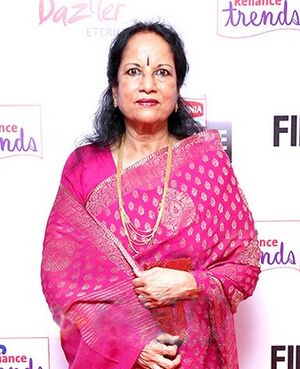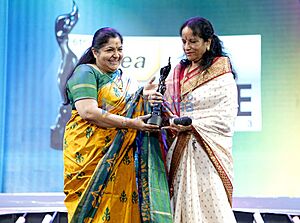Vani Jairam facts for kids
Quick facts for kids
Vani Jairam
|
|
|---|---|

Vani in 2014
|
|
| Born |
Kalaivani
30 November 1945 |
| Died | 4 February 2023 (aged 77) |
| Other names | South Indian Meera |
| Alma mater | Queen Mary's College, Chennai |
| Occupation | Playback singer |
| Spouse(s) |
Jairam
(m. 1969; died 2018) |
| Parent(s) |
|
| Awards | Padma Bhushan (2023)
National film award for best female playback singer Filmfare awards |
Vani Jairam (born Kalaivani; 30 November 1945 – 4 February 2023) was a famous playback singer from India. She sang for many movies. People often called her the "Meera of modern India" because of her beautiful voice.
Vani's singing career began in 1971 and lasted for over 50 years. She sang more than 20,000 songs for over a thousand Indian movies. She also recorded many devotional songs and performed in concerts around the world.
Vani was known for her amazing voice and how easily she could sing difficult songs. Many music composers chose her from the 1970s to the late 1990s. She sang in 19 different Indian languages, including Kannada, Tamil, Hindi, Telugu, and Malayalam.
She was the youngest artist to receive the "Sangeet Peet Samman" award. Vani won the National Film Awards for Best Female Playback Singer three times. She also won awards from the governments of Odisha, Andhra Pradesh, Tamil Nadu, and Gujarat. In 2012, she received the Filmfare Lifetime Achievement Award – South for her great work in South Indian film music.
Vani was skilled in many types of music. These included Carnatic, Hindustani, thumri, ghazal, and bhajan. Besides singing, she also wrote songs, composed music, and painted.
Contents
Early Life and Learning
Vani was born Kalaivani in Vellore, Tamil Nadu. She came from a family of musicians. She was the fifth of six daughters and had three brothers. Her parents, Duraisamy Iyer and Padmavathi, made sure she learned music.
She first learned Muthuswami Dikshitar kritis (songs) from Ranga Ramunaja Iyengar. Later, she had formal Carnatic training from other teachers. Vani loved listening to Hindi film songs on Radio Ceylon. She would remember and sing the whole songs, including the music. At just 8 years old, she gave her first public performance on All India Radio in Madras.
Vani went to Lady Sivasamy High School in Chennai. Then, she graduated from Queen Mary's College, Chennai. After her studies, she worked at the State Bank of India in Madras. In 1967, she moved to the Hyderabad branch.
Starting Her Career in Mumbai
After marrying Jairam in 1969, Vani moved to Mumbai. She asked her bank to transfer her there. Her husband, Jairam, knew she was a talented singer. He encouraged her to train in Hindustani classical music. She studied with Ustad Abdul Rehman Khan.
Her intense training made her leave her bank job to become a full-time musician. She learned different singing styles like Thumri, Ghazal, and Bhajan. She gave her first public concert in 1969. That same year, she met composer Vasant Desai. He was recording a Marathi album with singer Kumar Gandharva. Desai heard Vani's voice and asked her to sing the song "Runanubandhacha" for the album. This song became very popular with Marathi audiences.
Singing for Movies
Vani's popularity grew, and she started getting offers from the South Indian film industry.
Tamil Movies
In 1973, Vani recorded her first Tamil song. It was for the film Thayum Seiyum. Her first song that was actually released was a duet with T. M. Soundararajan for the film Veettukku Vandha Marumagal (1973). The song "Or Idam Unnidam" was very popular.
Her big break came with the song "Malligai En Mannan Mayangum" from the film Dheerga Sumangali (1974). This song was challenging, but she sang it perfectly. Music director M.S.Viswanathan was so impressed by her quick learning that he called her a 'Blotting paper'.
In 1975, Vani won her first National Film Award for Best Female Playback Singer. This was for her songs "Ezhu Swarangalukkul" and "Kelviyin Nayagane" from the film Apoorva Raagangal. These songs made her very famous. She became known as the singer who could handle difficult songs. She sang for many top music composers.
She also sang many popular songs with Ilaiyaraaja in the 1980s. Later, in 1994, A. R. Rahman recorded her voice for a song in the film Vandicholai Chinraasu.
Vani sang thousands of Tamil songs, both solo and duets. Many of her duets were with famous singers like T. M. Soundararajan and S. P. Balasubrahmanyam. Songs like "Ezhu Swarangalukkul" and "Megamae Megamae" are considered some of her best. "Megame magame" was the first Ghazal-style song in Tamil movies.
Telugu Movies
Vani sang many songs for Telugu cinema and devotional albums. Her first Telugu song was for the film Abhimanavanthulu (1973). Her songs for the film Pooja (1975) made her very well known.
For K. Viswanath's musical film Sankarabharanam (1979), Vani sang five songs. These songs made her even more popular and won her second National Film Award. She also won the Nandi Award for Best Female Playback Singer for these songs. She worked with director Viswanath and music director K. V. Mahadevan on many films.
In 1990, she received her third National Film Award for the film Swathi Kiranam. She recorded many Telugu songs with other composers like Rajan–Nagendra and Ilaiyaraaja.
Hindi Movies
Vani's connection with Vasant Desai led to her big break in the film Guddi (1971). Desai asked her to sing three songs. The song "Bole Re Papihara" became a huge hit and made her instantly famous. This song showed her classical singing skills and won her many awards. Another song, "Humko Mann Ki Shakti Dena," became a school prayer.
She sang for many other Hindi film music directors. These included Naushad, Madan Mohan, and R. D. Burman. She sang duets with famous singers like Kishore Kumar and Mukesh.
The song "Mere To Giridhar Gopal" from the film Meera (1979) won her first Filmfare Award for Best Female Playback Singer. She recorded 12 bhajans (devotional songs) for this film, which became very popular.
Malayalam Movies
Vani Jairam started singing in Malayalam in 1973. Her first song was "Sourayudhathil Vidarnnoru" for the film Swapnam. This song became very popular and helped her career. She went on to record over 600 songs in Malayalam movies.
She worked with many popular Malayalam composers. Her song "Aashada Maasam" (1976) was widely loved. After a long break, Vani returned to Malayalam cinema in 2014. She sang for the films 1983 and Action Hero Biju (2016).
Many of Vani's Malayalam songs are still very popular. These include "Olanjali Kuruvi" and "Thiruvonapularithan." Most of her duets in Malayalam were with K. J. Yesudas and P. Jayachandran. The title song "Marathe Marikurumbe" from the film "Puli Murugan" was even considered for an Oscar Award in 2018.
Kannada Movies
Music director Vijaya Bhaskar introduced Vani to Kannada cinema in 1973. She sang two songs for the film Kesarina Kamala. Her song "Bhaavavemba Hoovu Arali" from Upasane (1974) made her a star in Kannada films for three decades.
She worked with many top Kannada composers. The team of director Puttanna Kanagal, Vijaya Bhaskar, and Vani Jairam created many popular songs. She also sang female duets with S. Janaki.
Vani recorded many popular songs in the 1980s with the legendary actor-singer Dr. Rajkumar. Most of her duets in Kannada were with Rajkumar, P. B. Srinivas, and S. P. Balasubrahmanyam.
Odia Movies
Vani Jairam became very well known in Odisha in the 1970s and 1980s. She sang many songs in Odia films. She worked mostly with music composer Prafulla Kar.
Some of her big hits in Odia cinema include "Chhota E Ghara E Sansara" (1975) and "Megha Barasila Tupuru Tupuru" (1976). For the film Devajani, she won the Odisha State Film Award for Best Singer.
Other Languages
Besides Hindi and South Indian languages, Vani Jairam sang in many other languages. These included Gujarati, Marathi, Bengali, Urdu, and Punjabi. She won awards from the states of Gujarat (1975), Tamil Nadu (1980), and Odisha (1984).
One of her most famous Marathi songs, "Runanubandhachya," was a duet with classical singer Kumar Gandharva. She also recorded "Holi Songs" and devotional songs with Pandit Birju Maharaj.
Personal Life
Vani was married to Jairam. Her family supported her music career. Her mother-in-law, Padma Swaminathan, was also a Carnatic music singer.
Her Popularity
Vani Jairam became very popular overnight after her Hindi film debut in "Guddi" with the hit song 'Bole re papihara'. Her first song in Marathi with Kumar Gandharva was also a huge success. Similarly, her first songs in Tamil, Malayalam, Telugu, Kannada, Odia, and Gujarati all became very popular. This made people in each state feel like she was their own singer.
Vani was known for her unique voice and her ability to sing in many languages and styles. She was often chosen for very difficult songs. Examples include "aanathineeyara" from Swathi Kiranam and "yezhu Swarangalukkul" from Apoorva Ragangal.
Death
Vani Jairam passed away on 4 February 2023, at the age of 77. She died after a fall. Many political leaders and music stars shared their sadness about her passing. The Governor of Tamil Nadu, R. N. Ravi, visited her home to pay his respects.
Awards and Honors
Vani Jairam received many awards for her contributions to music.
National Honors
- 2023 - Padma Bhushan Award, one of India's highest civilian awards.
National Film Awards
- 1975 – Best Female Playback Singer for various Tamil songs (Apoorva Raagangal)
- 1980 – Best Female Playback Singer for various Telugu songs (Sankarabharanam)
- 1991 – Best Female Playback Singer for "Anathineeyara Hara" (Swathi Kiranam)
Filmfare Awards
- 2013 – The 60th South Indian Filmfare Award for Lifetime Achievements
- 1980 – Filmfare Award for Best Female Playback Singer for "Mere Toh Giridhar Gopal" (Meera)
State Awards
- 1972 – Gujarat State Film Award for Best Female Playback Singer – Ghoongat
- 1979 – Tamil Nadu State Film Award for Best Female Playback – Azhagae Unnai Aradhikkiren
- 1979 – Nandi Award for Best Female Playback Singer – Sankarabharanam
- 1982 – Odisha State Film Award for Best Singer – Debjani
Other Awards
- 1972 – Mian Tansen Award for Best Classical Song in Films ("Bol Re Papi Hara")
- 1991 – Kalaimamani Award from Tamil Nadu State for her work in Tamil film music.
- 1992 – The youngest artist to receive the "Sangeet Peet Samman"
- 2004 – M.K. Thyagarajar Bhagavathar – Life Time Achievement Award from Tamil Nadu Government
- 2012 – Subramanya Bharathi award for her music.
- 2014 – Life Time Achievement Award from Radio Mirchi
- 2014 – Asiavision Awards - Best Playback Singer Award for "Olanjali Kuruvi" from "1983"
- 2017 – Vanitha Film Awards - Best Singer
- 2017 – North American Film Awards - Best Female Playback Singer - Malayalam
- 2018 – Pravasi Express Awards Singapore, Life Time Achievement Award
Other Titles
- 2007: South Indian Meera
 | Janet Taylor Pickett |
 | Synthia Saint James |
 | Howardena Pindell |
 | Faith Ringgold |


